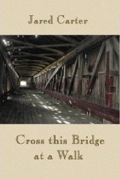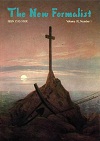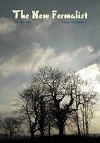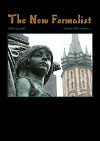The High Country
Drive up to where the smooth road takes a bend.
A peep-look in the rear-view has you knowing
corn-poppy, much behind is what’s ahead
to venture forth into a landscape flowing
table-lakes where you gamble for an end
from a road that knows now where it’s going:
don’t deliberate but turn instead
into a future that a past contrived.
Let it deliver you, fading into old
white, thatch-roof cottages of rambling farms
carved into shape by church or pagan pillage;
and let a mother-meadow’s ambling arms
embrace your no-direction hillocks, rolled
up into the parcel-prospect of a village;
unpack and shack up here, knowing
in all of this you have at last arrived.
The Kenchyn Girl
Our thick, imagined forest finds
the Kenchyn girl out mushrooming;
neat, curious, folk-pattern dressed,
attentive to the distant wolf-howl,
flash of fox in dusk hush looming,
what wind-drop in a melting snow
reveals in hum-snatch song along:
an amber twinkling in the dark
is gem to catch her satin interest.
Peeling back the sapling bark
she sees the German helmet sunk
moss-covered deep into the mud,
then rusty rails in bent direction,
as instinct offers her the bearing
to the grass-grown-over granite:
not what was once upon a clearing
but bent steel thick rusting rods
so twisted up to grasp the sky
that giants must have rested here
till driven out by warring Gods.
A wisdom in home-going song
is telling parents what she saw:
this was Wolf-Hitler’s lair, his
concrete fortress, till his hunters
trapped him in the Berlin bunker.
She too young to catch the fact:
bombs ripped this concrete apart;
the wolf escaped—that we know—
but deep in her Slavonic heart
an insight she is not far wrong.
Flinders Shore
Ships, in your knots of journey
untangled by the guessing tide—
what purpose to be born, built
in a miniscule, a distant Britain
too busy in her shifting history
to know what rock unlocks, silt
in a sea-weed rot reveals, your
reasons meant, unwritten on
this rich irrationale of shore.
Here, on a face of cave, turf
for the stallion race of wave
punched out of cliff, drilled
by the whip and slap of surf
knuckle-bone ocean stones
konk on the planks for days,
echo the step of press-gangs
and their rap on tavern door
to round up men for voyages,
bringing the gossip-maze, salt
of old conversation over ales
to whispering and sudden halt.
Waves, in your restless turning—
in long insomnia of sea—what
bad dreams are you driven by
to buck tall ships of tar, cargo,
letters of illicit love and hidden
prison notes, allow the dives
of your deep currents forage,
cull in a spread-wide farrago
for solumn secrets of our lives?
The Shed
There was a sabre in the shed—
I didn’t know what meant—
along with garden tools
that Dad had kept
perhaps as monument,
reminder of his dead
mates in New Guinea.
“Fifteen of us would go
out into jungle where
guns, big-fist rats
and Japanese were
waiting in the trees—
and only five come back.
But, for the moment, that’s
enough of that,” he said,
“it’s time for tea.”
Was potting round that lead
me to it—kid curiosity—
its falling from the tall
shelf let me see the faded
Melbourne Herald,
headline print gone brown
announcing War. Dad
didnt use it for the fires
of barbeques he had
for friends, unless the flames
would light up, funeral pyres
in dedication to his dead
mates in New Guinea.
“Some even drowned—
enough of that,” he said,
“it’s time for tea.”



